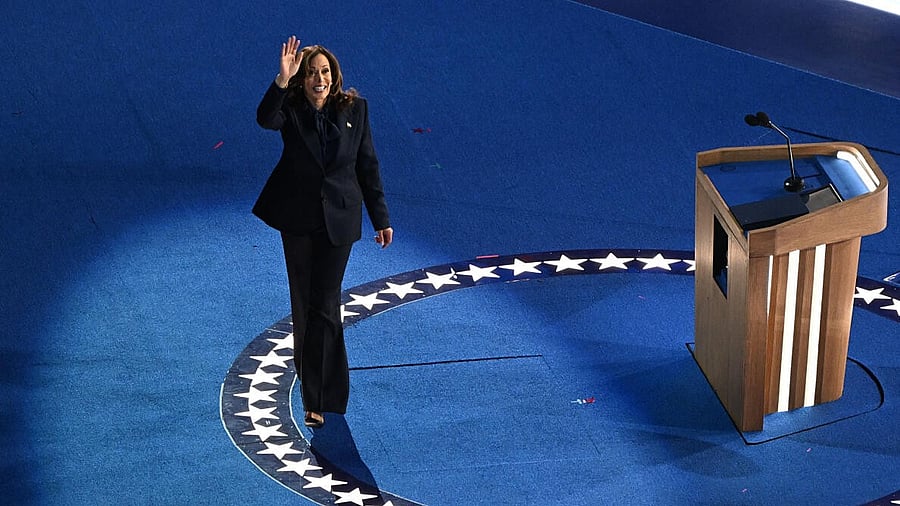
Kamala Harris.
Credit: Reuters Photo
Kamala Harris capped her first month as the Democratic Party's presidential candidate with a roughly 35-minute convention speech Thursday night that embodied her aggressive efforts to win over swing voters.
It was a patriotic speech that was hawkish on foreign policy and border security. She described the United States as the greatest country in the world -- a view many Americans hold but most Democratic voters do not -- and she ended by saying that being an American was "the greatest privilege on earth."
She promised to confront China, Russia, Iran and Iran-backed terrorists and to make sure that the US military remained the "most lethal fighting force in the world."
She also offered a series of populist promises to help the middle class by reducing the cost of housing and health care -- policies that many independents and some Republicans favor.
And she spent little if any time on subjects that inspire passion among Democrats but are either secondary or off-putting to many swing voters, such as student debt forgiveness and President Joe Biden's climate agenda.
Here's why Harris' move to the political center seems to be working, at least so far.
Who vs What
Harris has surged in the polls, erasing Biden's deficit and taking a small lead over Trump, for two main reasons. First, she has won over some swing voters, including independents, working-class Midwesterners and even a fraction of 2020 Trump voters.
Second, she has done so at no apparent cost: In addition to attracting swing voters, she has built a bigger lead than Biden had among the Democratic base, such as young voters, college graduates and city residents.
How could this be? It comes down to the difference between the who and the what of her candidacy.
Loyal Democrats are energized about the who. They spent months agonizing over Biden's flailing candidacy. Once he quit and Harris wrapped up party support in just a few hours, everything felt different.
Democrats remembered what it was like to have a candidate who could deliver a speech without making people fret that something was about to go wrong. Harris is full of energy and joy.
She can cogently explain the administration's policies, and she seems to be having fun in the process. Amid this electricity, many Democrats have been willing to tolerate her triangulation in the service of winning.
Harris isn't just another Democratic politician, either. She would be the country's first female president, of course, and is a woman of color. Today's Democratic Party puts great emphasis on identity, especially race and gender.
The party defines itself in large part as the defender of groups that suffer discrimination and injustice. Just watch Tuesday night's ceremonial roll call to nominate Harris, when delegates celebrated her historic status -- and their own identities.
This focus on personal identity can give pathbreaking candidates more flexibility to stray from Democratic orthodoxy without angering the base. Barack Obama benefited from a similar dynamic in 2008.
He was more moderate than some other Democratic candidates that year, yet he still excited many progressives. (Obama's speech this week was also fairly moderate. Nonetheless, it received rapturous applause.)
For all these reasons, Harris has formed an emotional bond with liberals and others who make up the Democratic base. That bond has freed her to pursue swing voters with the what of her candidacy. She offers an economic agenda that many working-class voters support.
She claims that she, not Trump, is the true candidate of border security. She encourages "USA!" chants. Thursday night, she referred to American history as "the most extraordinary story ever told."
A Tight Race
Even so, the presidential race remains close. Harris leads in enough states to win, but only just. And if recent polls have undercounted Trump voters as much as they did in 2016 and 2020, he would probably win an election held today.
With the convention now over, Democrats won't be able to control the narrative the way that they have this week. Republicans have already started running ads to remind voters of Harris' liberal past. One ad opens by calling Harris a "San Francisco radical" and showing her wearing a Covid mask while she announces her pronouns.
It then includes clips in which she calls for a ban on plastic straws, supports looser immigration policies and says more police officers don't lead to more safety. Expect to see a lot of these ads before November.
It is possible that Harris has been enjoying a temporary polling bump -- from the good vibes of replacing Biden -- that will soon fade. (In that case, I'll be curious to see if Harris goes even further to moderate her image; she said nothing Thursday night, for example, about whether she supported an "all of the above" energy policy to reduce prices.)
Nobody knows what will happen between now and Election Day. What's clear is that Harris has run an effective first month of her campaign, managing both to consolidate Democratic support and to moderately -- in both senses of the word -- expand her appeal.